For equal opportunities in digitisation
»The aim of our initiative is for Austria to make greater use of the opportunities offered by digitisation and to focus on equal opportunities.«
Digital technologies now cover almost all areas of life and are part of our every- day affairs. Digitisation has already facilitated matters in many areas, such as business, communications, access to education, goods and services, health and social services.
UNESCO report
“I would blush if I could”
In 2019, the UNESCO report “I would blush if I could” was published which systematically shows how design decisions still reflect stereotypical notions of gender roles. Numerous empirical studies show that women still have a great deal of catching up to do with digital skills or are still not sufficiently aware of their skills. The lack of digital skills places women at a significant disadvantage for opportunities to take part and position themselves in the labour market, as well as in the social, cultural and political sphere.
The often gender-specific support given to children and young people and the associated differences in the self-eval- uation of girls and boys in terms of their own compe- tencies for the future play a major role – especially in the MINT subjects (Mathematics, IT, Natural sciences and Technology).
What needs to be taken into account in particular in education?
One of the main conclusions of the UNESCO report is that developments in stereotyped technologies can only be effectively prevented if women and girls get involved in the development of these technologies right from an early stage – not only as potential users – but also focusing on them as future experts. The self-confidence of women and girls in digital technology stems from this and it is strengthened by the use of their existing skills. This will enable boys and girls, just like men and women, to become active designers of digital change, thereby jointly developing their digital self-confidence.
The recommendations for concrete actions
Based on this analysis, the UNESCO report came up with a total of 15 recommendations to close the gender gap in digital education. Our common concern – but also the urgent appeal to society – is that the UNESCO recommendations report should be publicised, discussed, developed and put into practice in the following four clusters that we have developed from them.
Institutionalising diverse and sustainable initiatives to attract girls and women to digital technologies and MINT subjects.
Ensuring that digital and ICT skills are learned right from primary and secondary education.
Training teachers with gender competence, at technical colleges, universities as well as at other training and f urther ed ucation institutions.
Gaining parents as allies in acquiring digital skills for their daughters.
Using gender-sensitive and inclusive language in the educational, research and work context.
Promoting positive experiences of girls and women with digital media (programming camps, digital games, etc.).
Promoting collaborative learning settings to help girls acquire digital skills.
Creating secure, fear-free learning settings for digital skills for women (e.g. courses for women and girls only).
Demonstrating and showing the benefits of digital skills for your own life.
Promoting role models and mentors for girls and women, boys and men – gaining confidence in different cooperation models.
Creating financial incentives and quotas for women in MINT programmes.
Empowering women through digital rights.
Ensuring sufficient financial resources by the State to support projects that close the digital gender gap.
Networking between state and private / non-governmental initiatives (NGOs, etc.).
Collecting and evaluating data (monitoring) to monitor the effectiveness of measures and projects.
Fact box
Skills versus self-image
Young girls underestimate their computer and IT skills significantly more than boys of the same age (UNESCO).
Patents in the hands of men
Only about every 14th patent in the field of new information and communication technologies is acquired by a woman (OECD).
Artificial intelligence
In the research trend area of machine learning, only around 12 percent of researchers are female (Element AI).
... and these are by no means all the facts about digital inequality!
Our request
As the Initiative for EQUAL OPPORTUNITIES IN DIGITISATION (“IDC”), we strongly believe that it is urgent that this report and its concrete demands be discussed, and then imple- mented in all fields, especially by representatives from business, politics, education, health, culture and media, as well as by experts in a wide range of forms in a wide public.
Our aim
The aim of our initiative is for Austria to make greater use of the opportunities offered by digitisation and to focus on equal opportunities. Only in a society in which equal opportunities are truly realised can we become economically successful together, while strengthening social cohesion sustainably and on an equal footing. We would like to invite you to use our paper to lead and intensify the discussion on digitisation and equal opportunities for a common sustainable future in your field.
Please send us your suggestions so that we can combine knowledge and experience to turn them into a joint action.
Who we are
We are women from a very wide range of fields in business, health, science, education, human rights and culture and have joined forces at the initiative of Doris Schmidauer. With the IDC, we are committed to ensuring that digital change is human, democratic, social and ecological, that it continues to develop and that the recommendations of UNESCO on this are put into practice in Austria and in the EU everyday life in the future thanks to our joint responsibility. It is our deepest convic- tion that digitisation must be structured to ensure equal opportunities. We would like to invite people from different fields to support us in making equal opportunities a reality in digitisation.
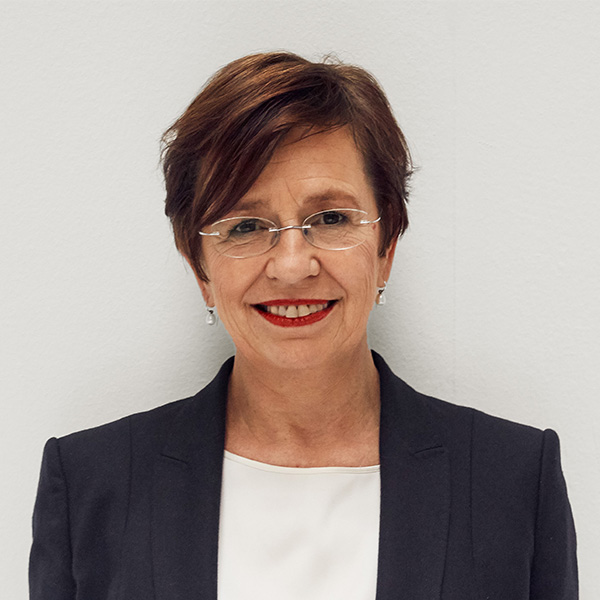
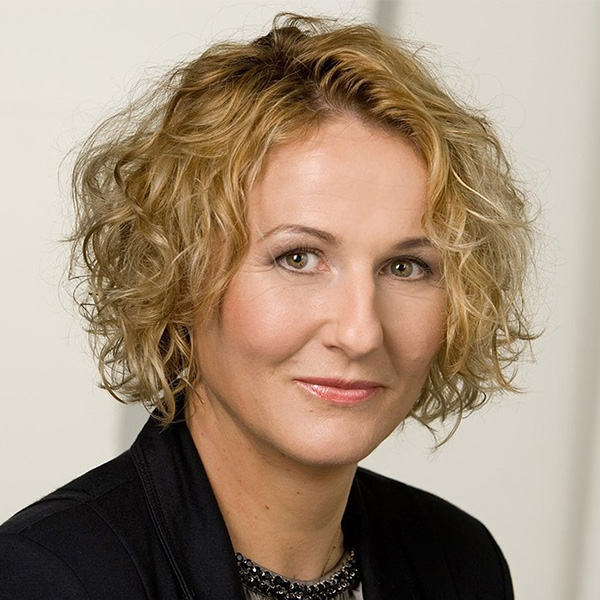
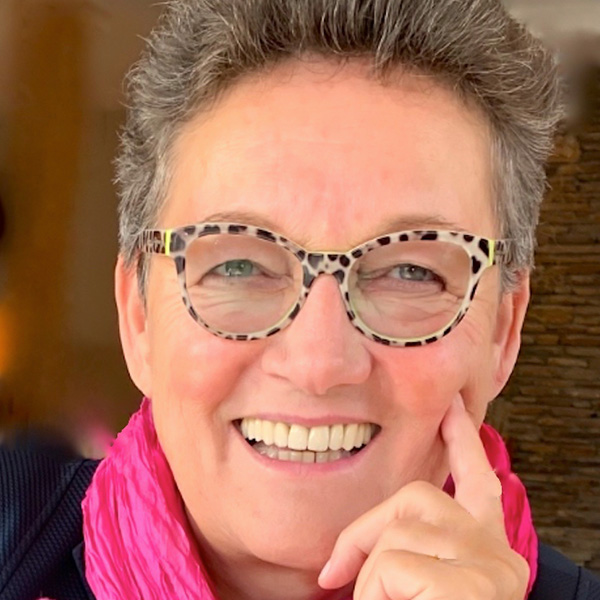
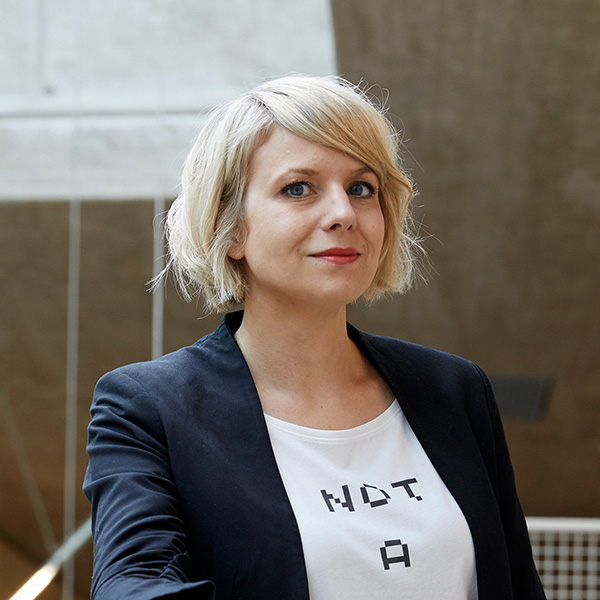
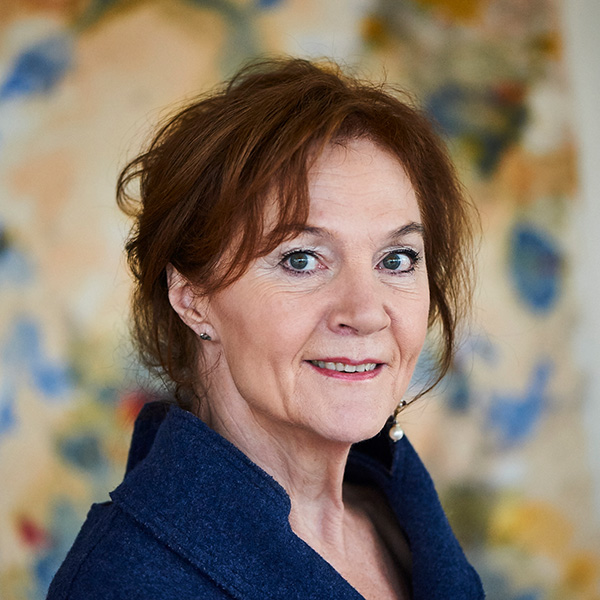
News & Events
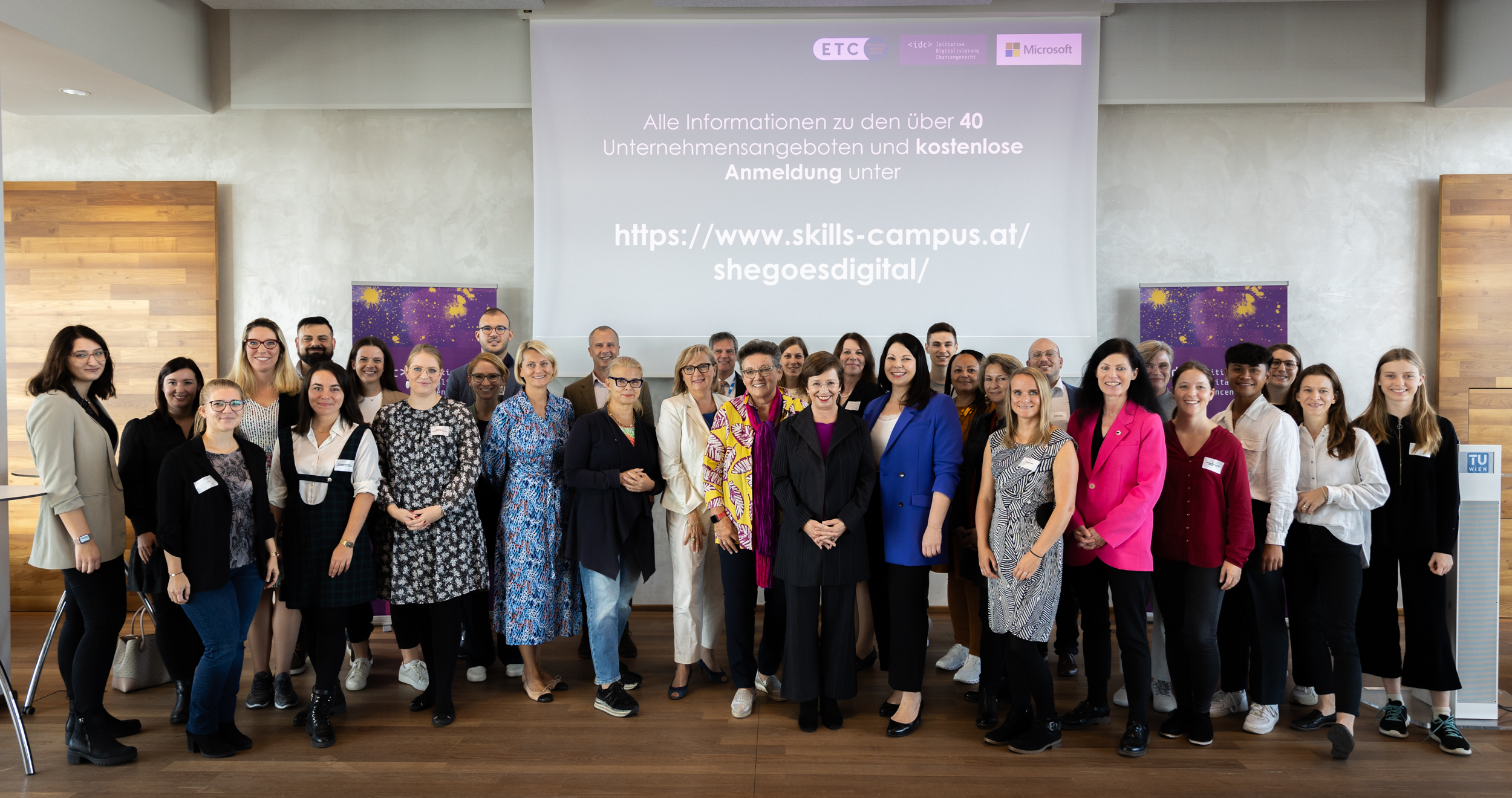
Event
SHE goes DIGITAL: Das Sprungbrett für Frauen in die IT geht in die 2. Runde
Wer die digitale Arbeitswelt hautnah erleben und sich mit spannenden Arbeitgebern vernetzen möchte, ist bei SHE goes DIGITAL (SGD) genau richtig.
Die Initiative Digitalisierung Chancengerecht (IDC) startet gemeinsam mit Microsoft Österreich eine neue Runde von SHE goes DIGITAL. SHE goes DIGITAL bietet Mädchen und Frauen kostenlose Workshops, Job-Shadowing, Mentoring und vieles mehr, um ihnen den Einstieg in die IT-Branche zu erleichtern. Interessierte können sich jetzt bis 15. Dezember 2023 kostenlos anmelden und diese einmalige Chance nutzen.
„Österreich kann es sich einfach nicht leisten, das Potenzial digitaler Macherinnen derart unausgeschöpft zu lassen“, sagt Doris Schmidauer. Die Hemmschwelle zu MINT-Fächern und digitalen Berufen ist für viele Frauen und Mädchen nach wie vor hoch: Laut dem Europäischen Institut für Gleichstellungsfragen sind beispielsweise nur 17 Prozent der 8 Millionen IKT-Fachkräfte in der EU weiblich. Um das zu ändern, setzt SHE goes DIGITAL auch 2023 zahlreiche Angebote für Mädchen und Frauen. Von Workshop-Formaten und Job Shadowing über Vorträge und Bootcamps mit Coding Sessions bis hin zu Mentoring-Programmen bietet SHE goes DIGITAL vielfältige Möglichkeiten, die digitale Arbeitswelt niederschwellig kennenzulernen und praktisch zu erproben. Das ist SGD 2023/2024.
SHE goes DIGITAL ist ein Projekt von Doris Schmidauer, Marlies Lenglachner und Ingrid Heschl (Microsoft Österreich) im Rahmen der Initiative Digitalisierung Chancengerechtigkeit (IDC). Das Projekt wird in Kooperation mit Microsoft Österreich, dem Bildungspartner ETC – Enterprise Training Center GmbH, unter der Leitung von Julia Katovsky umgesetzt. Zu den teilnehmenden Unternehmen gehören unter anderem IKEA, A1, Coca-Cola, PwC, das Kunsthistorische Museum Wien, der Flughafen Wien, Start-ups wie Independo und MATR oder der IT-Dienstleister Tietoevry Austria. 130 Teilnehmerinnen unterschiedlichsten Alters und beruflicher Hintergründe nutzten bereits 2022 die Chance, in 22 Unternehmen direkt in digitale Jobs hineinzuschnuppern. „Heuer konnten wir doppelt so viele Unternehmen aus den unterschiedlichsten Branchen begeistert werden“, sagt Doris Schmidauer. “Durch dieses Engagement der Unternehmen können auch in der neuen Runde viele Teilnehmerinnen einen praktischen Einblick in die Welt der Digitalisierung bekommen. Das freut uns wirklich sehr.“
Geschlechtergerechtigkeit beginnt in der Volksschule
Um den Gender Gap zu schließen, braucht es ein gesellschaftliches Umdenken und mehr Förderung für Mädchen und Frauen in MINT-Fächern und digitalen Berufen. „Der Weg zur Geschlechtergerechtigkeit beginnt bereits in der Volksschule“, sagt Doris Schmidauer. Rebecca Linhart, Projektteilnehmerin aus 2022 und HTL-Schülerin, berichtete etwa, wie bereits in der Schule Stereotype ersichtlich werden, indem zum Beispiel für Mädchen der Eintritt in eine Höhere Technische Lehranstalt weniger gefördert wird als für Buben. Sie wünscht sich mehr Aufklärung in den Schulen und Möglichkeiten für Mädchen, frühzeitig Einblicke in Unternehmen zu bekommen.
Vom Pilotprojekt zum IT-Sprungbrett
„Wir haben das Projekt als Pilot gestartet und es hat uns bestätigt, dass wir mit SHE goes DIGITAL genau richtigliegen. Gemeinsam mit den Unternehmen ist es uns gelungen, Frauen aller Altersgruppen einen unkomplizierten Einstieg in digitale Berufe zu ermöglichen. Damit tragen wir dazu bei, digitale Berufe für Mädchen und Frauen attraktiver zu machen und deren Vielfalt sowie neue Karrieremöglichkeiten für die Zukunft verstärkt aufzuzeigen“, so Ingrid Heschl. Die teilnehmenden Unternehmen und Institutionen (siehe Liste unten) bringen ihre vielen spannenden und innovativen Ideen in das Programm ein, um digitale Berufe für Mädchen und Frauen niederschwellig aufzuzeigen.
Mehr als nur schöne Worte
„Damit wollen wir dazu beitragen, dass digitale Berufe für Mädchen und Frauen attraktiver gemacht werden und deren Vielfältigkeit sowie neue Berufsmöglichkeiten für die Zukunft vermehrt aufgezeigt werden“, sagt Heschl. „Eine der Intentionen dieses Projektes ist es, Frauen die Chance zu bieten, ihre imaginären Hürden vor digitaler Arbeit durch diese praktischen Erlebnisse zu überwinden. Durch ihre neuen Erfahrungen in diesem Projekt können sie ihre Vorurteile abbauen und dadurch ihre Freude an digitaler Arbeit entdecken“, sagt Marlies Lenglachner.
Liste der teilnehmenden Unternehmen und Institutionen:
A1 Telekom Austria , ABZ*Austria, Austrian Institute of Technology (AIT), AMS, Apprentigo, ASFINAG, Avanade, Axians, BRZ, CityRiddler GmbH, Coca-Cola HBC Austria GmbH, Communardo, Crayon, DaVinciLab, Digital City, ETC – Enterprise Training Center, Flughafen Wien AG, Fortinet, Genetec, Hafen Wien, Hempstatic GmbH, HERTHA FIRNBERG SCHULEN, IKEA, Independo, Kunsthistorisches Museum Wien, LEA - Let's empower Austria, lp-digital, MATR, Mathausen KZ-Gedenkstätte, Mondi Group, Microsoft, MP2 IT-Solutions, Nagarro SE, ÖBB, Österreichische Präsidentschaftskanzlei, pcode - passion for people, PWC, RHI Magnesita, SBA Research, Tietoevry, Universitätsbibliothek der TU Wien, Wiener Stadtwerke Gruppe, WOMENinICT
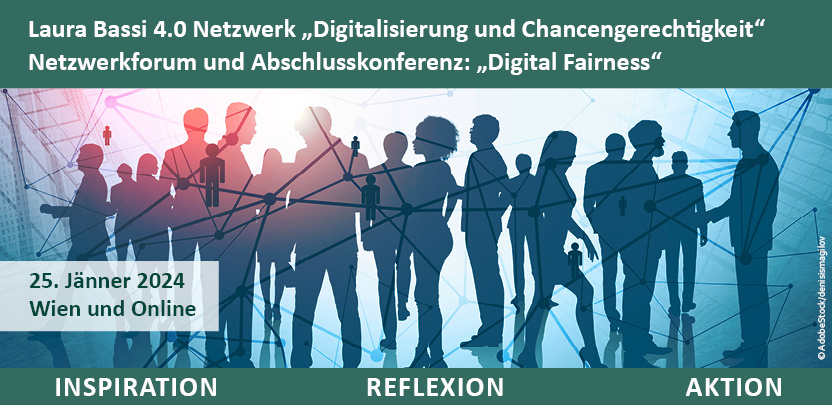
© Network Laura Bassi 4.0
Event
January 25, 2024, 09:30 - 16:00
Impact Hub, Lindengasse 56, 1070 Vienna / Online transmission
4. Laura Bassi 4.0 network forum „Digital Fairness“
Preliminary closing event of the Laura Bassi - Network on Digitalization and Equal Opportunities, on 25 January 2024 at Impact Hub Vienna, 1070 Vienna.
The symposium and preliminary closing event of the network will address the following questions, among others: How can we overcome thresholds and use data and digitization for the benefit of all? How can fair digitalization succeed in practice? What challenges are we facing as a result of artificial intelligence? What has the network been able to contribute to these questions so far? Click here to register.
The closing event awaits you:
- Inspiration!
- For example, through the keynote speech by Sabine Seymour (MOONDIAL). The founder of MOONDIAL is a data economist and expert on technology, data and their economic, ecological and social relevance. Since the mid-1990s, the multi-award-winning entrepreneur, professor and investor has been one of the leading lights of the tech scene in Europe and the USA. The MAK dedicated an exhibition to her life's work in 2014. As a keynote speaker, including at the German Zukunftsinstitut, she provides fascinating insights into the economy and society based on analyses and findings from trend and future research.
- Or the keynote statement by Gertraud Leimüller (winnovation consulting gmbh) on the topic of "Fair AI & how it works". The Harvard University graduate is the founder and managing director of one of the first open innovation management consultancies in Europe. She works as an evaluator in national and European innovation programs and also passes on her knowledge as a university lecturer, book author and columnist for a daily newspaper.
- A panel discussion with Martina Mara (Robopsychology Lab of the JKU Linz) and many other inputs.
- An insight into the results and learnings of recent years.
- The presentation of current study results.
- Exciting innovators, committed practitioners, resourceful solution seekers.
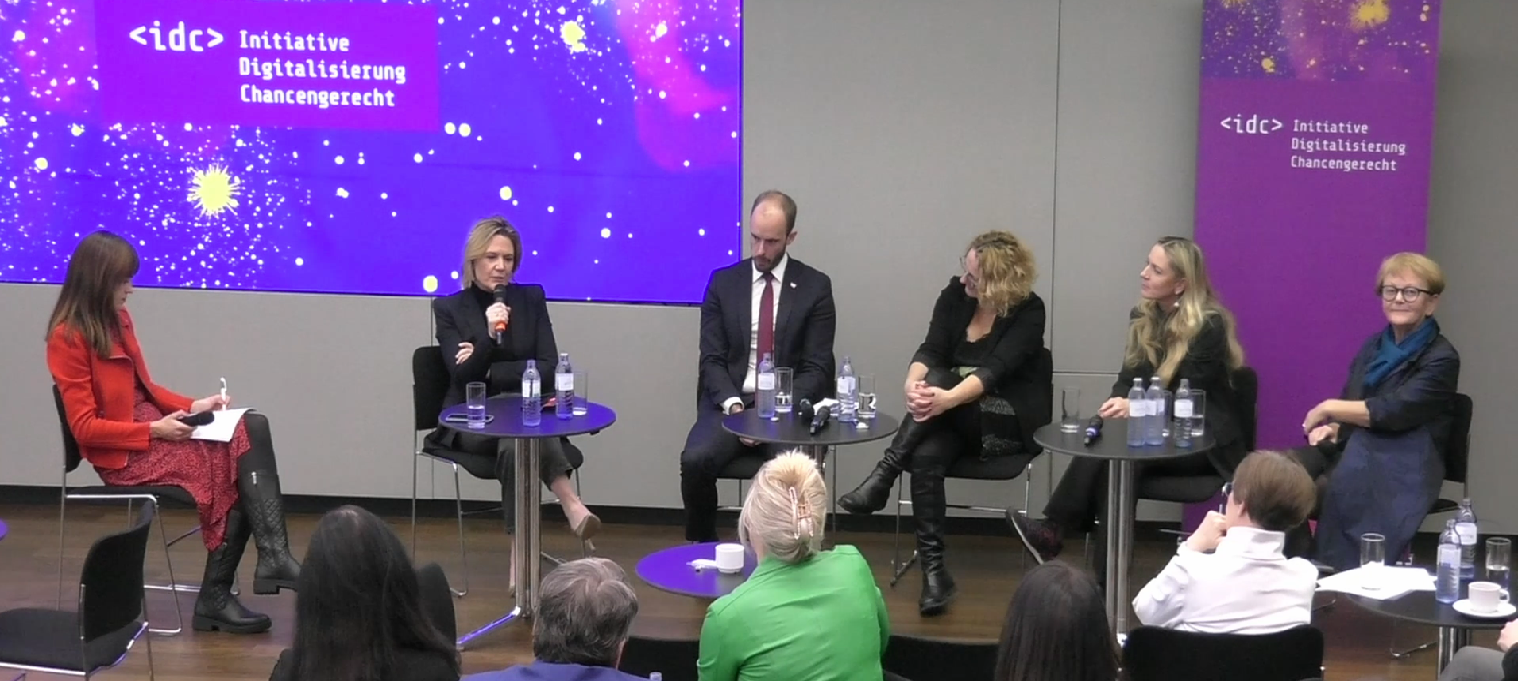
Video of the round table
4th Round Table Framework conditions for a digital transformation based on equal opportunities
"Only 5% of programmers worldwide are female. That's exactly what I was talking about before - in other words, the tools that are developed are predominantly developed by men, for men. If you ask 15-year-old girls, only 0.5% of them want to study computer science, while 5%, i.e. ten times as many boys aged 15, want to study computer science. The proportion of female computer science graduates in Austria is significantly lower - less than 30%" says Sabine Theresia Köszegi, Full Professor of Ergonomics and Organization at the Vienna University of Technology.
The image in society is changing - more and more women are interested in technology and digital professions. Good role models, the breaking down of old role models and the question: What role do public media play in this? Greater cooperation, a change in culture, less black-and-white thinking and more positive examples are also important. It's about highlighting opportunities and creating educational opportunities that are easily accessible.
Sabine Theresia Köszegi, Florian Tursky, Stefanie Groiss-Horowitz, Marlies Ettl and Gerlinde Macho will talk about these and other questions in an exciting panel discussion.
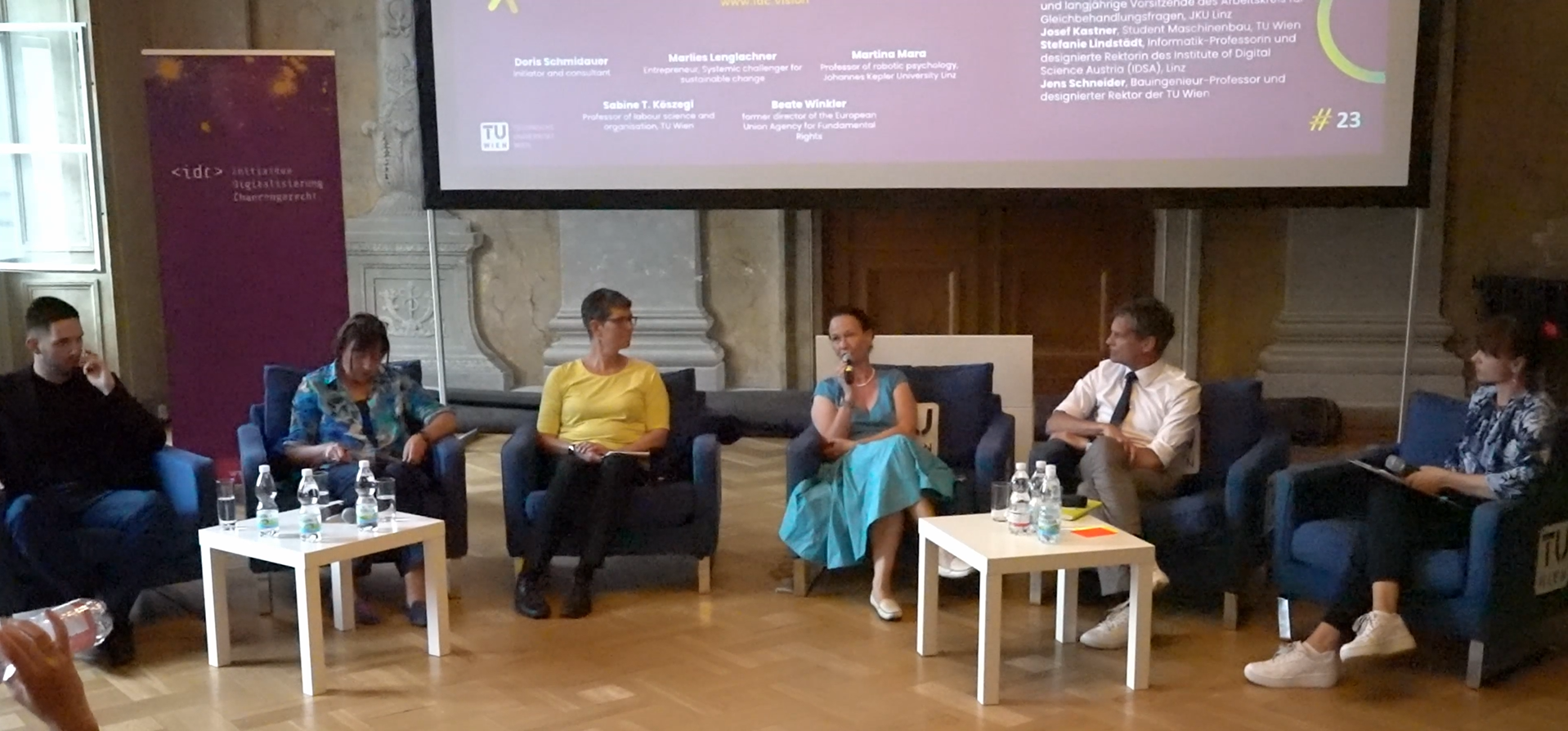
Video of the round table
July 5, 2023
Festsaal, TU Wien
3rd Round Table Programming as a cultural technique! Secure and self-determined in a digital future!
"We can't say it often enough: we know it - women are still severely underrepresented in the digital sector. We know that the gender pay gap comes from the environment and is also reflected in the digital world. And that has to change if we really want to achieve a change that is equal in terms of opportunities. We at IDC are convinced that this change is absolutely necessary if we want to take full advantage of the opportunities offered by digitalization. Women make up half of society. Without them - without us - we will only ever move forward at half speed. And who wants that? Full speed ahead - that should be the motto." says Doris Schmidauer, co-founder of IDC.
How do we create more awareness and sensitization and establish a new technology culture? How do we achieve the urgently needed cultural change at universities - and how do we specifically address male students on the topic of gender equality? Do we need mandatory gender training? Stefanie Lindstädt, Cäcilia Innreiter-Moser, Jens Schneider, Corinna Bath and Josef Kastner discuss these and other questions in an exciting panel discussion.
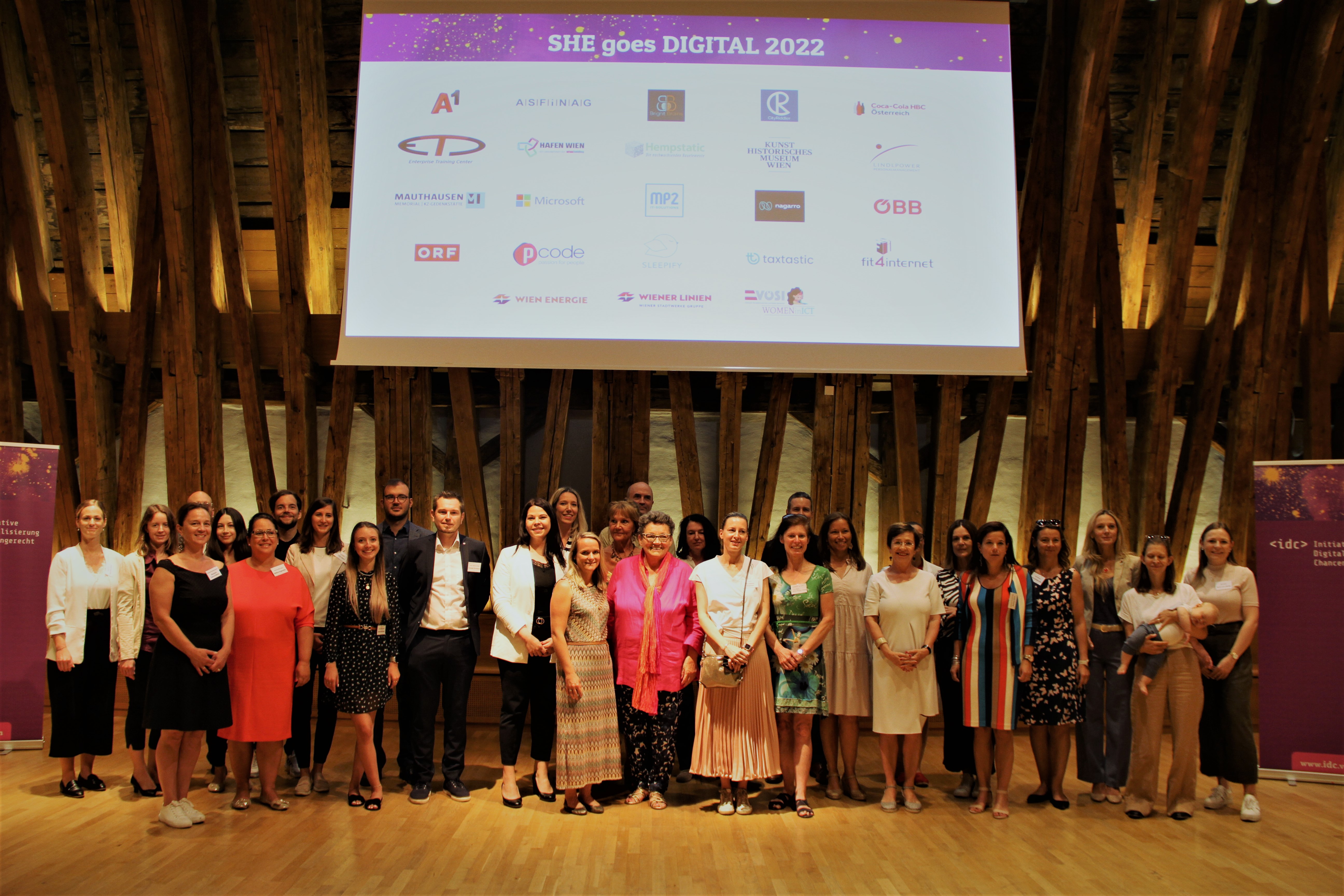
Event
July 7, 2022
Kuppelsaal, TU Wien
Press conference on the new SHE goes DIGITAL 2022 project
As part of the Initiative Digitalisierung Chancengerecht (IDC), the press conference for the new project SHE goes DIGITAL 2022 took place on July 7, 2022 in the Kuppelsaal of TU Wien:
Together with Microsoft Austria, the Initiative Digitalisierung Chancengerecht is launching the SHE goes DIGITAL 2022 project, where girls and women can immerse themselves in a wide variety of interesting corporate worlds and gain a hands-on insight into the extensive subject area of digitalization - as of now, they can apply for workshops and many other formats at exciting companies and institutions to network with potential employers and test themselves in the digital field of work. The application period runs until 07/31/2022.
Although digital gadgets, algorithms and the internet are shaping our lives like never before, even in 2022 women are still severely underrepresented in the development of these technologies and at the same time the IT market is looking for new workers. According to the OECD, only one in 14 technology patents is filed by a woman. In the scientific field of machine learning, only about 12 percent of research personnel are female. At Austria's universities, the proportion of female computer science graduates is only around 15 percent - below the EU average. "Austria cannot afford to let the potential of female digital doers go so untapped. Because that puts women at a systematic disadvantage, but it's also a problem for all of us," says Doris Schmidauer, co-founder of IDC.
Prefer to study something technical
In school, girls are still often encouraged to prefer not to study anything technical, as a survey from Upper Austria shows. "This often gender-specific encouragement of children and young people is a major reason why adolescent girls underestimate their computer and IT skills to a much greater extent than boys of the same age," explains Schmidauer. And if girls develop lower skills in important digital cultural techniques, their chances of shaping and participating in everyday life, work and society are also lower.
This is SHE goes DIGITAL 2022
With the SHE goes DIGITAL 2022 project, the Initiative Digitalisierung Chanchengerecht (IDC), in collaboration with Microsoft Austria and its cooperation partner, the ETC education platform, invites young people to discover and practically test the diverse career opportunities offered by digitalization.
"One goal of the project is for companies and organizations to work outside their own silos on opportunity-oriented digitization to address the important social issues of the future, take joint responsibility for them, and find joint socially relevant solutions," emphasizes Marlies Lenglachner, co-founder of IDC.
The participating companies and institutions (see list below) contribute their numerous, exciting and innovative ideas to the program on how to make digital careers more interesting for girls and women, and at the same time create more visibility for potential career opportunities for girls and women in their companies through this offering. The offerings range from workshop formats and job shadowing to lectures and boot camps with coding sessions as well as mentoring programs.
"In this way, we want to contribute to making digital professions more attractive to girls and women and increasingly highlight their diversity as well as new career opportunities for the future," says Ingrid Heschl, HR Lead at Microsoft. "One of the intentions of this project is to offer women the chance to overcome their imaginary hurdles in front of digital work through this hands-on experience. Through their new experiences in this project, they can break down their prejudices and thereby discover their joy in digital work," adds Marlies Lenglachner.
The project idea arose from a conversation between Doris Schmidauer, Marlies Lenglachner and the former managing director of Microsoft Austria Dorothee Ritz. After Ritz moved to Germany, the cooperation with Microsoft was continued by the new managing director, Mr. Hermann Erlach, and with Ingrid Heschl, HR lead at Microsoft.
List of participating companies and institutions
A1 Telekom Austria, ASFINAG, Bright Brains e.U., CityRiddler, Coca-Cola HBC Austria, Hafen Wien, Hempstatic, Kunsthistorisches Museum Wien, Lindlpower Personalmanagement, Mauthausen KZ-Gedenkstätte, Microsoft Österreich, MP2 ITSolutions, Nagarro, ÖBB-Holding, ORF, pcode – passion for people, Sleepify, Taxtactic Women in IT, Verein fit4internet, Wien Energie, Wiener Linien, WOMENinICT
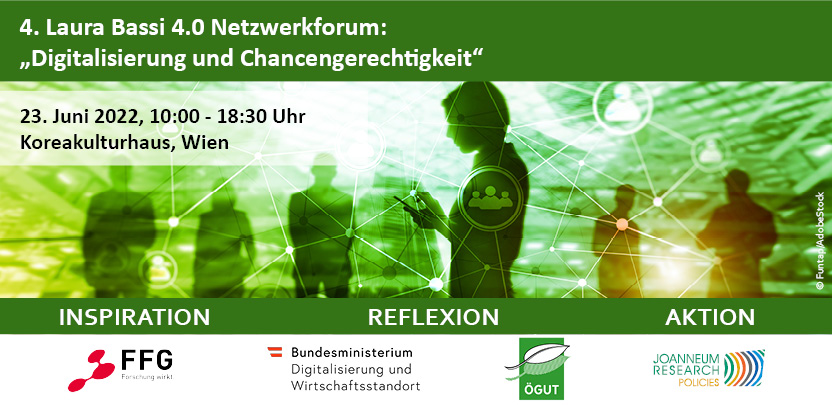
© Network Laura Bassi 4.0
Event
23 June 2022, 10:00 – 18:30
KOREAKULTURHAUS
Arbeiterstrandbadstraße 122, 1220 Vienna
4. Laura Bassi 4.0 network forum „Digitalization and equal opportunities“
Since 2020, the Laura Bassi 4.0 Network "Digitalization and Equal Opportunity" has been working to ensure that digitalization is designed with equal opportunities in mind. What approaches to solutions for equal-opportunity digitalization have the Laura Bassi 4.0 projects and the working groups developed so far? What has the network been able to contribute? In this first face-to-face event of the network, we will bring practitioners before the curtain and present good practices.
Video of the panel discussion
Ars Electronica Center,
Linz, September 8, 2021
Siri, look for "female programmer": What needs to be done to bridge the digital gender divide in Austria?
"As part of the opening of Ars Electronica 2021, the IDC's concerns were dealt with in detail in a panel discussion. What can be done against the digital gender divide in Austria? - This question was discussed by Gerfried Stocker, Artistic Director of Ars Electronica, Christiane Spiel, Professor of Educational Psychology, University of Vienna, Carina Zehetmaier, Ambassador Women in AI Austria and Mariana Karepova, President of the Austrian Patent Office. In her keynote as an introduction to the discussion, author and digital expert Ingrid Brodnig stated that at the beginning of IT development in the 50s and 60s, women did take over development work, especially in coding. This work required a great deal of attention to detail. It was only when the importance of IT was recognized that there was an increasing proportion of men in development and the proportion of women was becoming ever smaller. In the panel discussion, Christiane Spiel pointed out the discrepancies in socialization - boys are twice as likely to get a computer than girls, or the shared computer is always in the boy's room. Mariana Karepova from the Patent Office confirmed that most patents are registered by men and that women are still less likely to think that their innovation is «so valuable»."
SAVE THE DATE
September 8, 2021,
3:30 p.m. - 5:00 p.m.
Siri, look for "female programmer": What needs to be done to bridge the digital gender divide in Austria?
Panel discussion as part of Ars Electronica 2021
We have to do something. Still. Or maybe more than ever. Because although digital gadgets, algorithms and the Internet determine our lives more than ever before, women are still severely underrepresented in the development of these technologies, even in 2021. According to the OECD, only every 14th technology patent is filed by a woman. At Austria's universities, the proportion of female computer science graduates is around 15 percent - and thus below the EU average. Girls at school are still often advised not to study anything technical, a survey from Upper Austria shows. But if girls develop fewer skills in important digital cultural techniques, their opportunities to shape and participate in everyday life, work and society are also reduced. This is not only a systematic disadvantage for women, but also a problem for the whole country: Can we afford to let the potential of digital women makers remain so untapped?
As part of Ars Electronica 2021, the "Initiative Digitalisierung Chancengerecht" (IDC) launched by Doris Schmidauer invites high-ranking experts from education, technology, business, culture and media to a discussion. After a keynote by Ingrid Brodnig, we will address the following questions: What are the causes of the digital gender divide? How can girls be empowered to become self-confident creators of digital transformation? What specific measures must be taken in Austria to create digital equal opportunities for women?
With this discussion, the IDC is kicking off a series of autumn round tables, which will develop recommendations for Austria based on the UNESCO recommendations on closing the digital gender divide.
If you do not want to miss this event and would like to be there live online, please send us an email with your contact details to veranstaltungen@hofburg.at. We will get in touch with you soon with an official invitation including a link to participate.
We look forward to your online participation!
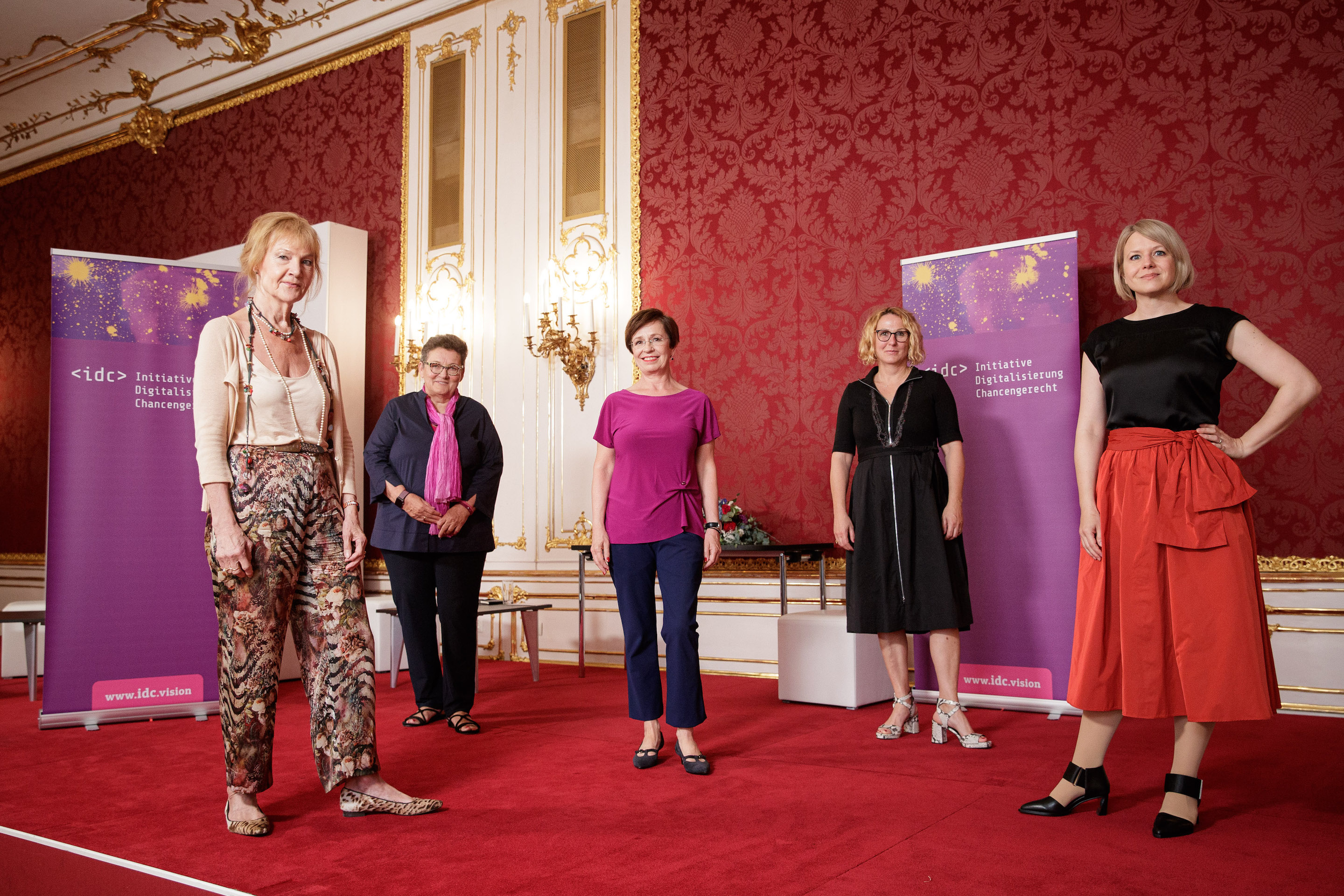
© Peter Lechner/HBF
Event
Vienna's Imperial Palace,
June 11th, 2021
Presentation of the Initiative
On June 11th, 2021, the IDC carried its impulse into society with a public appeal from the Hofburg. We say THANK YOU for your participation and the valuable contributions! We are now planning our further activities and look forward to seeing you again at Ars Electronica 2021!